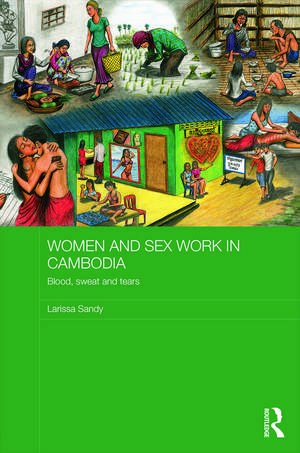Women and Sex Work in Cambodia: Blood, sweat and tears
Autor Larissa Sandyen Limba Engleză Hardback – 26 aug 2014
| Toate formatele și edițiile | Preț | Express |
|---|---|---|
| Paperback (1) | 312.43 lei 6-8 săpt. | |
| Taylor & Francis – 25 mai 2017 | 312.43 lei 6-8 săpt. | |
| Hardback (1) | 818.28 lei 6-8 săpt. | |
| Routledge – 26 aug 2014 | 818.28 lei 6-8 săpt. |
Preț: 818.28 lei
Preț vechi: 1101.81 lei
-26% Nou
Puncte Express: 1227
Preț estimativ în valută:
156.60€ • 160.37$ • 130.26£
156.60€ • 160.37$ • 130.26£
Carte tipărită la comandă
Livrare economică 18 martie-01 aprilie
Preluare comenzi: 021 569.72.76
Specificații
ISBN-13: 9780415681599
ISBN-10: 0415681596
Pagini: 156
Ilustrații: 9
Dimensiuni: 156 x 234 x 13 mm
Greutate: 0.36 kg
Ediția:1
Editura: Routledge
Colecția Routledge
Locul publicării:Oxford, United Kingdom
ISBN-10: 0415681596
Pagini: 156
Ilustrații: 9
Dimensiuni: 156 x 234 x 13 mm
Greutate: 0.36 kg
Ediția:1
Editura: Routledge
Colecția Routledge
Locul publicării:Oxford, United Kingdom
Public țintă
PostgraduateCuprins
1. Introduction 2. Filles Malades: Sex Work in French Cambodia, 1863-1953 3. Sihanouk’s Thesis ‘A’ and ‘B’: Sex Work in Post-Independence Cambodia 4. The Social and Cultural Context of Sex Work 5. Just Choices: The Moral And Political Economies of Sex Work 6. Core Transmitter/Sex Slave: Ten Years of Regulating Sex Work (1998-2008) 7. Conclusion
Descriere
Prostitution is strongly embedded in local cultural practices in Cambodia. Based on extensive original research, this book explores the nature of prostitution in Cambodia, providing explanations of why the phenomenon is so widely tolerated.















